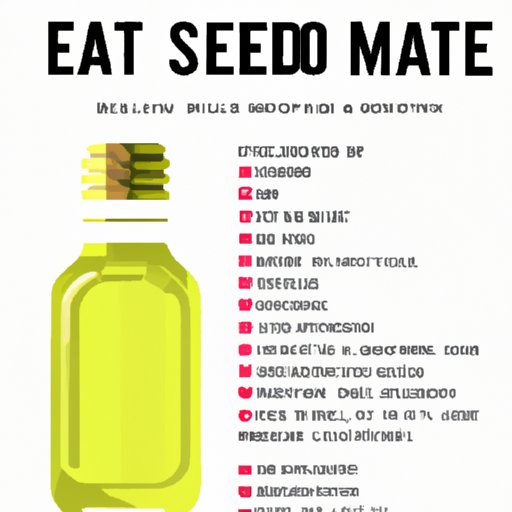Introduction
Dietary fats play an important role in our overall health and wellbeing. From providing energy to helping with digestion, these essential nutrients are necessary for optimal health. But not all fats are created equal. It’s important to understand the different types of fats and which ones are beneficial for our health.

A Comprehensive Guide to Healthy Fats
There are four main types of dietary fats: monounsaturated fats, polyunsaturated fats, saturated fats, and trans fats. Let’s take a closer look at each one.
Monounsaturated Fats
Monounsaturated fats are found primarily in plant-based foods such as nuts, seeds, avocados, and olives. These fats are considered to be “good” because they can help reduce bad cholesterol levels and improve heart health. Monounsaturated fats are also thought to reduce inflammation, which can help protect against certain diseases.
Polyunsaturated Fats
Polyunsaturated fats are another type of “good” fat. They are found in fatty fish such as salmon and tuna, as well as in plant-based foods such as flaxseed and walnuts. Polyunsaturated fats can help lower bad cholesterol levels and improve heart health. They are also rich in omega-3 fatty acids, which can help reduce inflammation.
Saturated Fats
Saturated fats are found primarily in animal-based foods such as red meat, poultry, and dairy products. These fats have been linked to an increased risk of heart disease and stroke, so it’s important to limit your intake of saturated fats. However, small amounts of saturated fats can still be part of a healthy diet.
Trans Fats
Trans fats are the least healthy type of fat and should be avoided whenever possible. These fats are created through a process called hydrogenation, which makes liquid oils more solid. Trans fats are found in processed foods such as margarine, crackers, and cookies. Eating trans fats can increase your risk of heart disease, stroke, and type 2 diabetes.
Exploring the Benefits of Different Types of Fats
Monounsaturated Fats
Monounsaturated fats are associated with several health benefits. Studies have shown that replacing saturated and trans fats with monounsaturated fats can help reduce bad cholesterol levels and lower your risk of heart disease. Additionally, monounsaturated fats can help reduce inflammation, which can help protect against certain diseases.
Polyunsaturated Fats
Polyunsaturated fats are another type of “good” fat. They are rich in omega-3 fatty acids, which can help reduce inflammation, reduce bad cholesterol levels, and improve heart health. Additionally, polyunsaturated fats can help reduce the risk of certain diseases such as cancer and arthritis.
Saturated Fats
Saturated fats can still be part of a healthy diet, but it’s important to limit your intake. Studies have shown that eating too much saturated fat can increase your risk of heart disease and stroke. However, there are some sources of saturated fat that may provide health benefits, such as coconut oil and grass-fed beef.

How to Make Smart Choices When it Comes to Dietary Fats
Making smart choices when it comes to dietary fats is key to maintaining a healthy lifestyle. Here are some tips to help you select foods that are high in healthy fats:
Understanding Serving Size and Calories
It’s important to pay attention to serving size and calories when selecting food products. Eating too many calories can lead to weight gain, while eating too few can lead to nutritional deficiencies. Be sure to read the nutrition facts label on food products to determine the amount of calories and fat per serving.
Reading Food Labels
Reading food labels can help you make smarter choices when it comes to dietary fats. Look for foods that are low in saturated fats and trans fats and high in monounsaturated and polyunsaturated fats. Also, pay attention to the ingredient list and avoid products that contain partially hydrogenated oils, which are a source of trans fats.
Knowing Your Nutritional Needs
Everyone has different nutritional needs, so it’s important to know what yours are. Speak with your doctor or a registered dietitian to determine how much fat you should be consuming on a daily basis. This will help you make informed decisions when it comes to selecting food products and planning meals.
Incorporating Healthy Fats Into Your Diet
Foods High in Healthy Fats
When it comes to incorporating healthy fats into your diet, there are many delicious options. Foods that are high in monounsaturated and polyunsaturated fats include fatty fish such as salmon and tuna, nuts and seeds, avocados, olive oil, and nut butters. You can also find these healthy fats in plant-based foods such as tofu, tempeh, and edamame.
Substituting Healthy Fats for Unhealthy Ones
You can also make simple substitutions in your diet to replace unhealthy fats with healthier ones. For example, you can use olive oil instead of butter in baking recipes. You can also swap out red meat for leaner cuts of chicken or fish, which are higher in healthy fats. Additionally, you can use nut butters instead of processed spreads, such as jelly or jam.

Cooking with Healthy Fats: Tips and Recipes
Healthy Fats to Use for Cooking
When it comes to cooking with healthy fats, there are several options to choose from. Olive oil, avocado oil, and coconut oil are all great options for sautéing and roasting vegetables. Nuts and seeds are also a good source of healthy fats, so you can add them to salads, yogurt, or smoothies. Additionally, you can use nut butters to add flavor and texture to dishes.
Tips for Healthier Cooking
In addition to using healthy fats, there are other ways to make your cooking habits healthier. Avoid deep frying, which adds extra calories and fat. Instead, opt for baking, grilling, or roasting. You can also reduce calories by cutting back on added sugars and salt. Finally, be sure to include plenty of fruits and vegetables in your meals.
Sample Recipes
If you’re looking for inspiration, here are a few recipes that feature healthy fats:
- Grilled Salmon with Avocado Salsa
- Vegetable Stir Fry with Cashews
- Chickpea Salad with Tahini Dressing
- Oatmeal Raisin Cookies with Coconut Oil
Conclusion
Dietary fats play an important role in our overall health and wellbeing. There are four main types of dietary fats: monounsaturated fats, polyunsaturated fats, saturated fats, and trans fats. Monounsaturated and polyunsaturated fats are considered to be “good” fats, while saturated and trans fats should be limited. Making smart choices when it comes to dietary fats is key to maintaining a healthy lifestyle. By understanding serving size, reading food labels, and knowing your nutritional needs, you can easily incorporate healthy fats into your diet. Finally, don’t forget to enjoy cooking with healthy fats – there are plenty of delicious recipes to try!
Summary
Dietary fats are an essential part of a healthy diet. Not all fats are created equal, and it’s important to understand the different types and their benefits. Monounsaturated and polyunsaturated fats are considered to be “good” fats, while saturated and trans fats should be limited. Making smart choices when it comes to dietary fats can help you maintain a healthy lifestyle.
Final Takeaways
- Monounsaturated and polyunsaturated fats are considered to be “good” fats.
- Saturated and trans fats should be limited.
- Pay attention to serving size and calories when selecting food products.
- Read food labels to determine the amount of fat per serving.
- Know your nutritional needs so you can make informed decisions.
- Incorporate healthy fats into your diet by eating fatty fish, nuts and seeds, avocados, and olive oil.
- Use healthy fats when cooking and avoid deep frying.
(Note: Is this article not meeting your expectations? Do you have knowledge or insights to share? Unlock new opportunities and expand your reach by joining our authors team. Click Registration to join us and share your expertise with our readers.)
